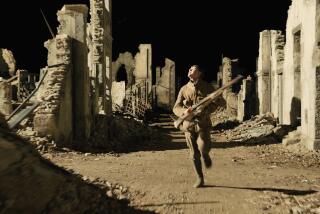Review: David Abrams’ ‘Fobbit’ is an impressive Iraq war satire
- Share via
Fobbit
A Novel
David Abrams
Black Cat: 372 pp., $15 paper
In “Going After Cacciato,” Tim O’Brien’s brilliantly inventive 1978 novel, the title character seeks to escape the madness of 20th-century warfare by simply walking away from the rice paddies of Vietnam and heading for Paris, some 6,800 miles away. Whether real or imagined, the point of the surreal exercise is to get out of the line of fire — the farther away, the better.
The soldiers deployed to Iraq in “Fobbit,” a first novel by David Abrams, a former Army public affairs specialist who served there in 2005, are far less adventurous in their approach to staying alive, especially if they work in the type of administrative, support, logistics or supply job that does not require them to be in close contact with an enemy all too eager to obliterate them.
A “fobbit” is a fairly new coinage: It’s a word distinctive to the war in Iraq — an amalgam of “FOB” for forward operating base, with the final syllable a bow to J.R.R. Tolkien’s “The Hobbit”: “Like the shy, hairy-footed hobbits of Tolkien’s world,” Abrams explains of the “marshmallow” warriors he has chosen to satirize, “they were reluctant to go beyond their shire, bristling with rolls of concertina wire at the borders of the FOB.”
The setting for their little oasis in the desert is a palace in suburban Baghdad once the pride and joy of Saddam Hussein. There is air conditioning, excellent food, entertainment, Internet cafés and only occasional dealings with the native population; sure, there is only nonalcoholic “near beer” to consume in their cozy hooches at night, and physical contact with the females among them is forbidden with a fury that would pass muster with the Puritans of colonial New England, but the idea here is survival.
“If the FOB was a mother’s skirt,” Abrams writes, “then these soldiers were pressed hard against the pleats, too scared to venture beyond her grasp.”
There is, of course, a plenitude of combat-hardened soldiers in uniform with unbridled courage coursing through their veins, but they are decidedly on the margins of this jaundiced view of today’s military. Of the few actual combatants we do meet, only Lt. Col. Vic Duret, a battalion commander who must deal with the ineptitude of a clueless captain, rises to the level of grace under pressure.
Abrams’ characterization of Capt. Abe Shrinkle is of a depressingly shallow man more concerned with hoarding care packages sent from the States than he is in the welfare of his platoon. Stripped of command by Duret, he is reduced to folding towels in the “lifestyle fitness center” and sneaking off under the assumed identity of a British archaeologist to the more relaxed environment of the Australian sector.
Another officer hopelessly out of his element is the blundering Lt. Col. Eustace Harkleroad, the obese head of public affairs whose inability to deal with a crisis of any magnitude, especially in a world with a 24-hour news cycle, is critical. The central “voice” of the novel is that of Staff Sgt. Chance Gooding Jr., like Abrams a public affairs functionary whose wry observations of the war without end — especially in the obfuscating way they are “communicated” to an incredulous press corps — are chronicled in a daily journal.
The problem with writing a darkly comic novel about soldiers caught in the maelstrom of modern warfare is that it inevitably invites comparison with Joseph Heller’s classic “Catch-22,” which is unfortunate, because, let’s face it, there’s only one Mt. Everest in the Himalayas. Abrams seems to concede this tacitly in the text — his alter ego Gooding is reading the book by a swimming pool in Qatar while on R&R; — and more pointedly again in his acknowledgments.
But Abrams does have a genuine sense of humor that is more often than not on point, and a productive sense of irony to go with it that takes full advantage of a milieu in which irony abounds. “Fobbit” is an impressive debut and holds out promise for more good things to come.
Basbanes’ ninth book, “On Paper,” will be published next year by Alfred A. Knopf.
More to Read
The biggest entertainment stories
Get our big stories about Hollywood, film, television, music, arts, culture and more right in your inbox as soon as they publish.
You may occasionally receive promotional content from the Los Angeles Times.










